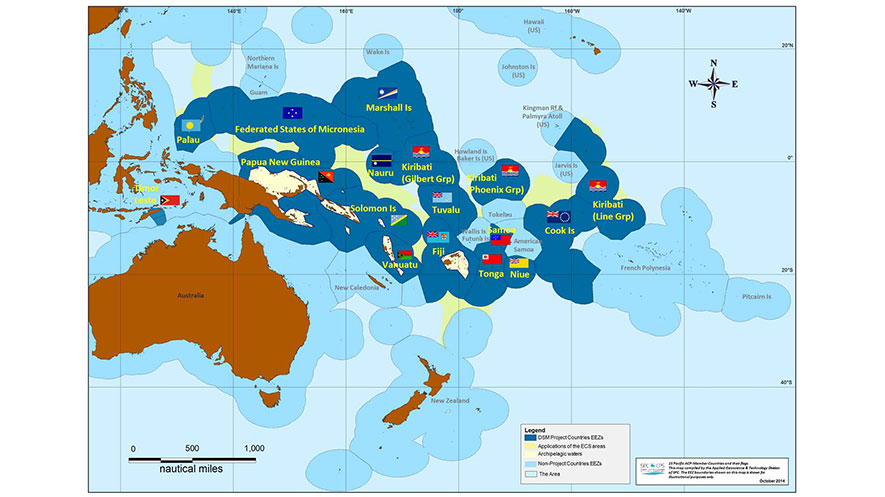Deep sea mining of mineral deposits is a developing industry in the Pacific, but so far, it has lacked the regulatory frameworks that will ensure environmental protection or the equitable use of revenue.
That changed on 30 June 2016, when the Pacific Community - European Union - Deep Sea Minerals Project (SPC-EU-DSM) launched two regional frameworks that could be considered and used as a guide for Pacific Island countries when developing relevant national policy, legislation and regulations related to financial and environmental aspects of deep-sea minerals development.
The Regional Environmental Management Framework contains an overview of deep-sea mineral deposit environments and potential environmental impacts of deep-sea mining projects, as well as management and mitigation strategies, including an environmental impact assessment report template. It serves as a guide for Pacific countries, informing and supporting them to make sound decisions regarding their deep-sea mineral resources and to take appropriate measures to reduce environmental risks, should they wish to engage in the mining industry.
Prepared in collaboration with the International Monetary Fund through the Pacific Financial Technical Assistance Centre, the Regional Financial Framework is aimed at providing Pacific countries with a guide to the major issues to be addressed when setting up national financial frameworks, and provides an overview of key issues in the financial management of revenues and wealth associated with the potential development of deep sea minerals in the region.
In welcoming the new frameworks, the Cook Islands Seabed Minerals Commissioner, Paul Lynch, said the Cook Islands was very pleased that SPC had responded to numerous stakeholder requests for the development of these two important resources.
“Along with other Pacific Island states, we’ve been able to meaningfully contribute to these critical foundation documents. They will, in very real, practical ways, assist our communities and decision-makers in our individual countries to continue to make good, informed decisions on if, how and when to develop our respective national DSM frameworks and resources, as the international DSM sector continues to make steady progress,” Mr Lynch said.
The frameworks were released during the 46th meeting of SPC’s Committee of Representatives of Governments and Administrations (CRGA) in the presence of representatives of more than 25 countries.The Deep Sea Minerals Project is a collaboration between the Pacific Community and the European Union. Initiated in 2011, the €4.4 million DSM Project is helping Pacific Island countries to improve the governance and management of their deep-sea minerals resources in accordance with international law, with particular attention to the protection of the marine environment and securing equitable financial arrangements for Pacific Island countries and their people. The DSM Project has 15 member Pacific Island Countries: the Cook Islands, Federated States of Micronesia, Fiji, Kiribati, Marshall Islands, Nauru, Niue, Palau, Papua New Guinea, Samoa, Solomon Islands, Timor Leste, Tonga, Tuvalu and Vanuatu. For more information, click here.
The two frameworks are available on the Deep Sea Minerals Project website at: Pacific-ACP States Regional Environmental Management Framework for Deep Sea Minerals Exploration and Exploitation





